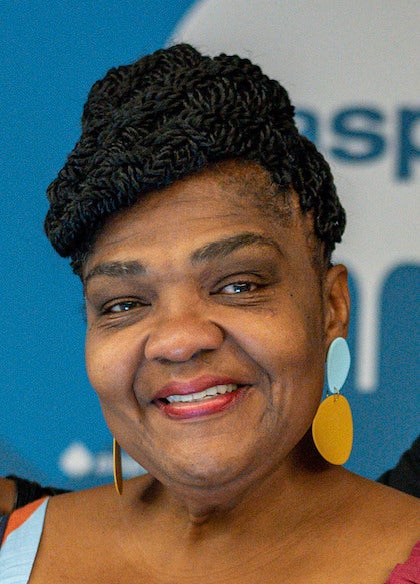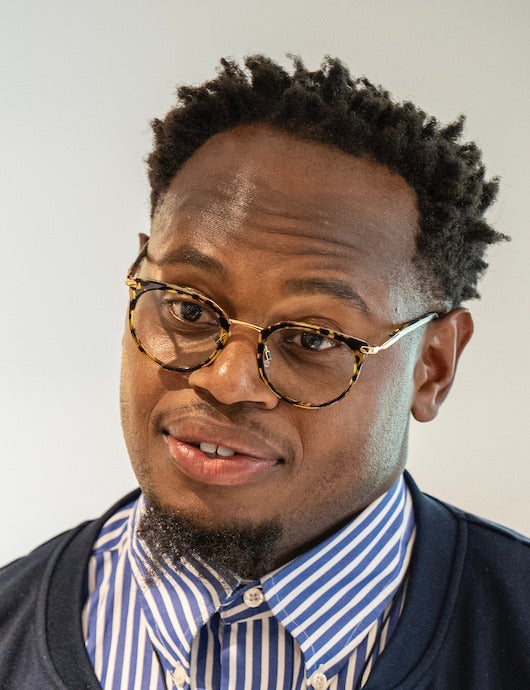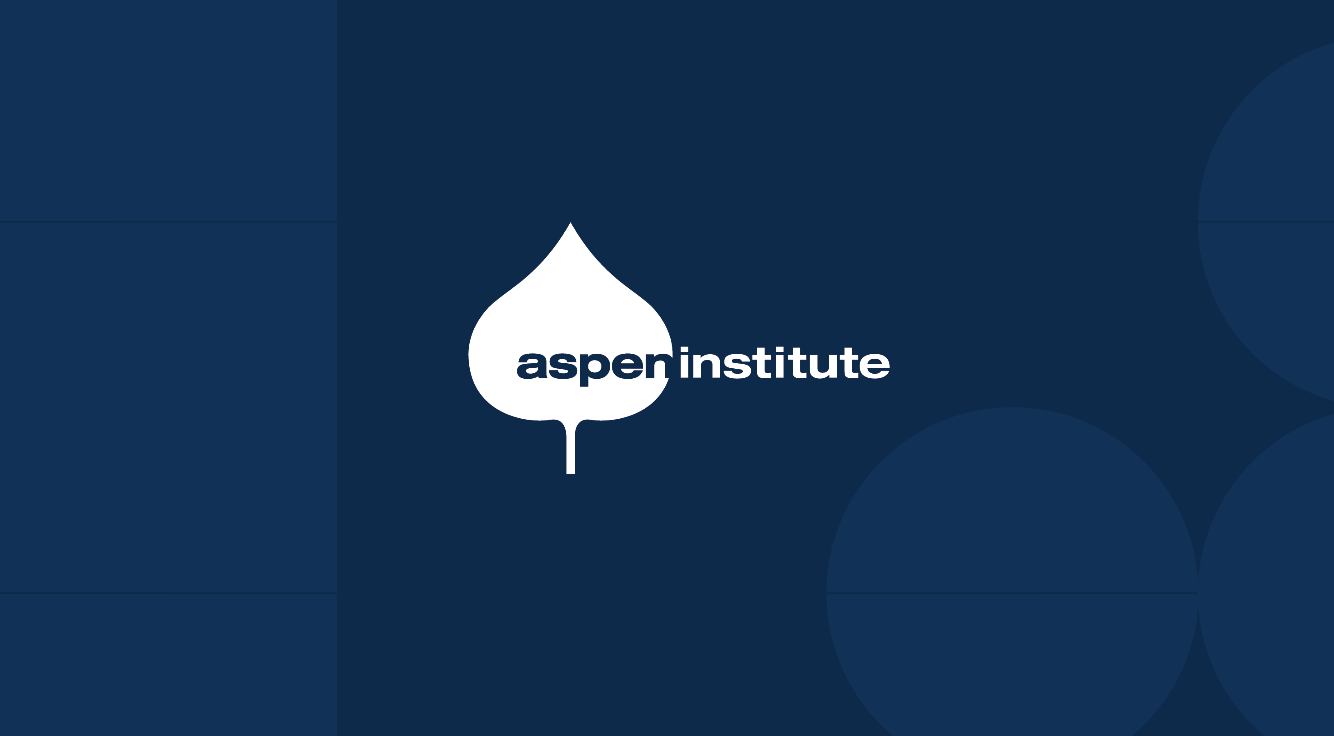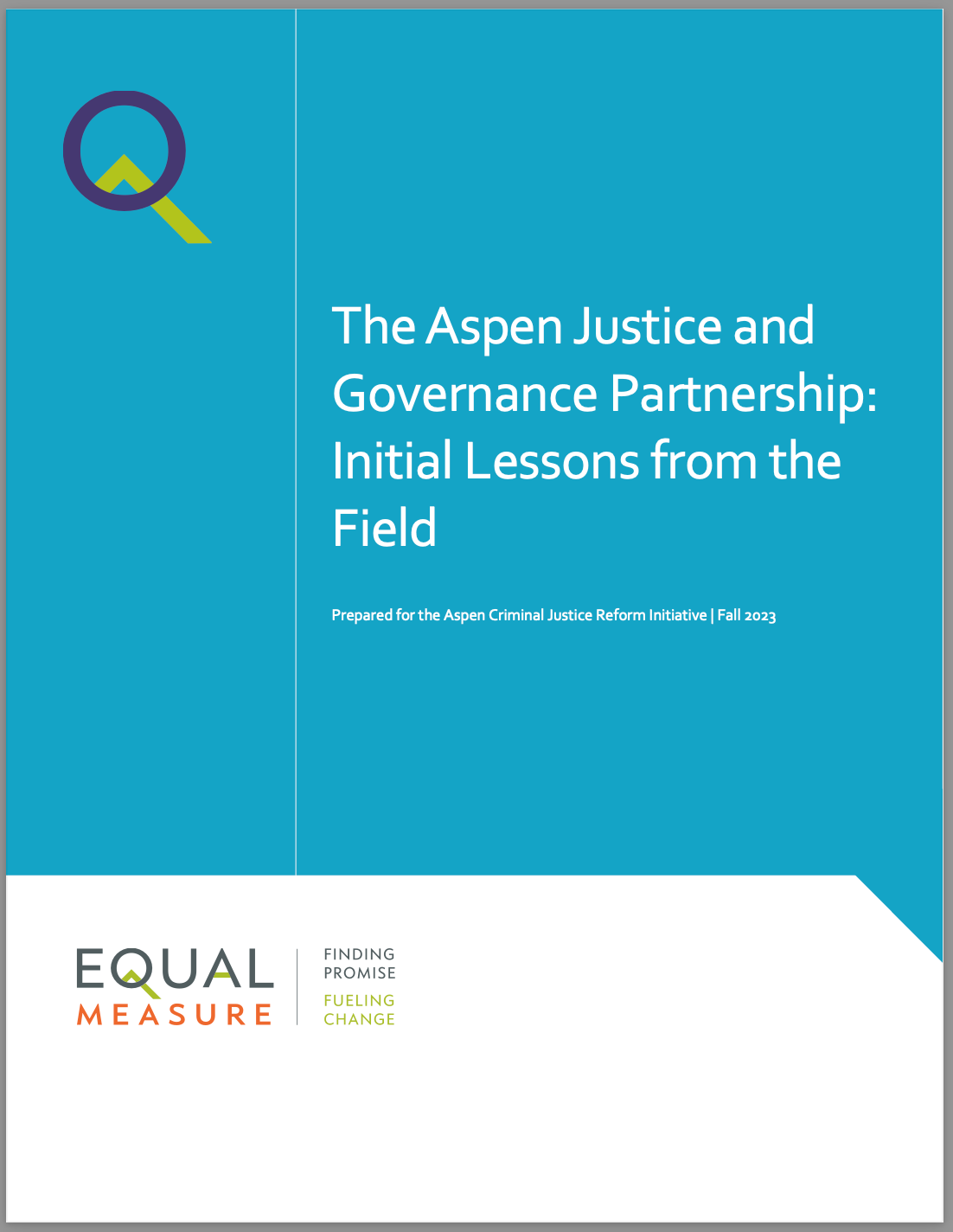While attending the inaugural Aspen Justice Network (AJN) convening, I had the opportunity to sit down and record several conversations with other attendees. I talked to community members from all of the Justice and Governance Partnership’s (JGP) jurisdictions: Birmingham AL, Grand Rapids MI, and rural South Carolina. AJN attendees ranged from educators to police officers and city council members. They all graciously answered my questions, and our conversations focused on two main topics: what aspect of criminal justice matters to you most, and how do you imagine public safety? Since AJN, I pieced together those conversations to examine and document how leaders across communities and occupations are thinking about criminal justice.
“Public safety means freedom,” said Dr. Zenobia Edwards, Executive Director of Old  North State Medical Society in South Carolina. As someone who has dedicated their life to education and providing a voice for those who need guidance when navigating systems, she expressed how crucial it is that people have the freedom to meet their needs within institutions that often don’t provide the necessary support. Freedom and safety, as Zenobia explained, should not be limited to a certain set of people, “Everyone’s interested in safety, even people who threaten that safety. I think about the students I’ve worked with and their parents. Some of them have placed the safety of others in jeopardy, but they themselves don’t want to be placed in harms way.” In essence: everyone’s well-being matters.
North State Medical Society in South Carolina. As someone who has dedicated their life to education and providing a voice for those who need guidance when navigating systems, she expressed how crucial it is that people have the freedom to meet their needs within institutions that often don’t provide the necessary support. Freedom and safety, as Zenobia explained, should not be limited to a certain set of people, “Everyone’s interested in safety, even people who threaten that safety. I think about the students I’ve worked with and their parents. Some of them have placed the safety of others in jeopardy, but they themselves don’t want to be placed in harms way.” In essence: everyone’s well-being matters.
 Parris McMurray, Supervisor of Community and Student Services at Grand Rapids Public Schools in Grand Rapids, expounded on the idea of why someone might act in a way that impedes on public safety. He used his experience as an educator to explain how acts that endanger others are often a result of people’s needs that haven’t been met. McMurray said:
Parris McMurray, Supervisor of Community and Student Services at Grand Rapids Public Schools in Grand Rapids, expounded on the idea of why someone might act in a way that impedes on public safety. He used his experience as an educator to explain how acts that endanger others are often a result of people’s needs that haven’t been met. McMurray said:
“Typically, disruptive behavior in the classroom is connected to avoidance because of either a lack of understanding or something that they’re bringing to the school from home. Being able to help a student understand and express ‘I’m angry because at home this happened to me.’ We need to give them the emotional intelligence to be able to express their needs. […] If we look at that on a global level, many of our communities experience the same things. These expressions of violence, these expressions of disruption and discord within the community are often cries because ‘I am home insecure, or I’m educationally insecure. There are things that I need that I don’t have access to.’ We talk about criminal justice, but it’s part of justice as a whole—economic justice, educational justice, public development justice.”
McMurray presented the key notion that crime is a product of economic and social circumstances and cannot be solved through the criminal justice system alone. Its root causes must be holistically addressed via core institutions like healthcare, education, housing, financial opportunities, etc. If you look at the neighborhoods with the least amount of crime, it’s not because they have high volumes of policing—or what we call crisis management governance— it’s because they have the infrastructure to support individuals.
 Dr. Anthony C. Hood, Chief of Diversity Equity and Inclusion at First Horizon Bank and Chairman of the Board of Commissioners for the Housing Authority in Birmingham, expressed his concern that such infrastructure does not exist in his community. During our conversation on the last day of the convening, he shared with me that his brother, a nonviolent offender who received a 99-year sentence due to the three-strike policy, was going up for parole the following day. The following day happened to be Dr. Hood’s birthday. He spoke about his brother with the care and devotion loved ones deserve: “How do we make sure he comes back into an environment that is going to support him being a productive citizen? How can we make sure that he can thrive and gain employment and not engage in recidivism? Which I know he won’t, but there are so many trappings in our community, particularly in a community like Birmingham, that has suffered so much disinvestment from resources and support.”
Dr. Anthony C. Hood, Chief of Diversity Equity and Inclusion at First Horizon Bank and Chairman of the Board of Commissioners for the Housing Authority in Birmingham, expressed his concern that such infrastructure does not exist in his community. During our conversation on the last day of the convening, he shared with me that his brother, a nonviolent offender who received a 99-year sentence due to the three-strike policy, was going up for parole the following day. The following day happened to be Dr. Hood’s birthday. He spoke about his brother with the care and devotion loved ones deserve: “How do we make sure he comes back into an environment that is going to support him being a productive citizen? How can we make sure that he can thrive and gain employment and not engage in recidivism? Which I know he won’t, but there are so many trappings in our community, particularly in a community like Birmingham, that has suffered so much disinvestment from resources and support.”
 The questions Dr. Hood asked are crucial if we are to effectively change our communities. As James Liou, a Senior Director at Equal Measure said, “With the right set of questions, [our work] really does point to new sets of potential partners, priorities and actions that are shared across institutions and people. People are experts in their own lives. Accessing that and the way that allows them to wonder out loud and with each other about ‘how could things be different’ is powerful.”
The questions Dr. Hood asked are crucial if we are to effectively change our communities. As James Liou, a Senior Director at Equal Measure said, “With the right set of questions, [our work] really does point to new sets of potential partners, priorities and actions that are shared across institutions and people. People are experts in their own lives. Accessing that and the way that allows them to wonder out loud and with each other about ‘how could things be different’ is powerful.”
The power from asking the right questions is starting to manifest itself within JGP and the Aspen Institute’s Criminal Justice Reform Initiative’s work. Joe Marogil, Board Member of the ACLU of Michigan, explained what asking questions has done in Grand Rapids:
 “When you ask the individual police officers about it, they never think about the root causes but hate being the crisis managers. I think we’re giving them an opportunity to think about root causes in a way that they’ve never done before, and it’s opening their eyes. Those are the types of things that give me hope, and it’s all throughout the chain. Our public health community is thinking the same way. They think, ‘man, we’re spending all this money on emergency room care, and if we spent half the money on preventative care, we’d do twice the good.’ But there’s never been a push from an organization that has thought about how that could actually happen and coordinate the entities that would make that possible.”
“When you ask the individual police officers about it, they never think about the root causes but hate being the crisis managers. I think we’re giving them an opportunity to think about root causes in a way that they’ve never done before, and it’s opening their eyes. Those are the types of things that give me hope, and it’s all throughout the chain. Our public health community is thinking the same way. They think, ‘man, we’re spending all this money on emergency room care, and if we spent half the money on preventative care, we’d do twice the good.’ But there’s never been a push from an organization that has thought about how that could actually happen and coordinate the entities that would make that possible.”
Marogil described a kind of rethinking that emerged as a theme with many of the  community conversations. For example, one of his fellow community members, John Wittkowski, Supervisor of the Special Operations Team, which includes homelessness outreach and mobile crisis, for the Grand Rapids Police Department. Wittkowski told me, “Throughout these last couple of days, it’s been quite evident that law enforcement can be a trigger. It can be trauma-inducing. But if we look at this from the perspective of service provision, and utilize other social services and organizations, we reimagine what law enforcement is with a kinder, gentler approach. And I know this is not new, this is not innovative, but I think we’ve lost our way.”
community conversations. For example, one of his fellow community members, John Wittkowski, Supervisor of the Special Operations Team, which includes homelessness outreach and mobile crisis, for the Grand Rapids Police Department. Wittkowski told me, “Throughout these last couple of days, it’s been quite evident that law enforcement can be a trigger. It can be trauma-inducing. But if we look at this from the perspective of service provision, and utilize other social services and organizations, we reimagine what law enforcement is with a kinder, gentler approach. And I know this is not new, this is not innovative, but I think we’ve lost our way.”
What Marogil and Wittikowski talked about seems to be the starting point for dismantling unjust and oppressive systems that perpetuate incarceration. As Brandon  Fontenot Johnson, Director of Policy for the City of Birmingham, pointed out, these systems have existed in America since its beginning and had a disproportionate impact on people of color. He said, “I am Black man, and the impact on the Black community has been destructive generation to generation. I do subscribe to it as a continuation of slavery and oppression in many forms, so liberating people oppressed by government systems, particularly unjust government systems, is the most important part of the work to me.” When I asked Johnson how do we interrupt systems that have an intergenerational impact, he replied: “Focus on people. See people and acknowledge what they’ve been through, both as individuals and intergenerationally, and address those issues they’re facing today. Start in the moment. See people for who they are, mind, body, and soul, and how they got to be who they are.”
Fontenot Johnson, Director of Policy for the City of Birmingham, pointed out, these systems have existed in America since its beginning and had a disproportionate impact on people of color. He said, “I am Black man, and the impact on the Black community has been destructive generation to generation. I do subscribe to it as a continuation of slavery and oppression in many forms, so liberating people oppressed by government systems, particularly unjust government systems, is the most important part of the work to me.” When I asked Johnson how do we interrupt systems that have an intergenerational impact, he replied: “Focus on people. See people and acknowledge what they’ve been through, both as individuals and intergenerationally, and address those issues they’re facing today. Start in the moment. See people for who they are, mind, body, and soul, and how they got to be who they are.”
While CJRI’s work is ambitious and has a community and nationwide scope, it is important to remember that change begins on an individual level. The aim of this work is to improve and empower the lives of people and changing the systems they exist in is the mechanism through which that aim is realized. Reimagining justice is no small task, but if we start by changing people’s hearts and minds, we can change the narrative, heart, and mind of our country. As Dr. Zenobia Edwards told me, “You can change your destiny simply by changing your mind.”
Willem Patrick is an Associate Producer of CJRI’S podcast, Shades of Freedom, and a Senior English major and Russian Studies minor at Colorado College.

